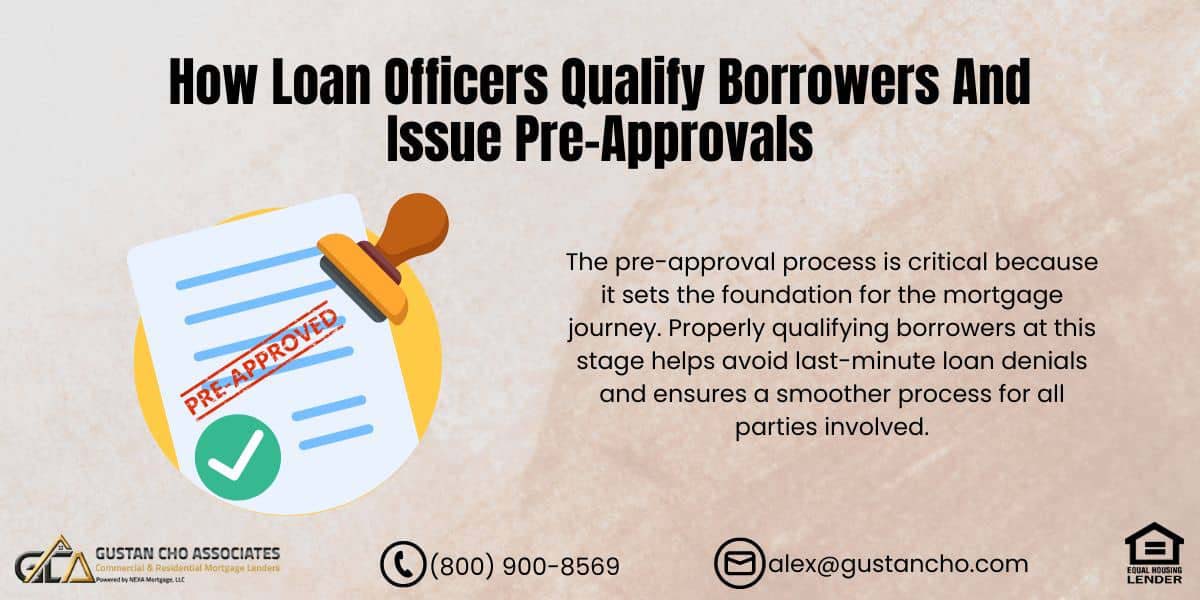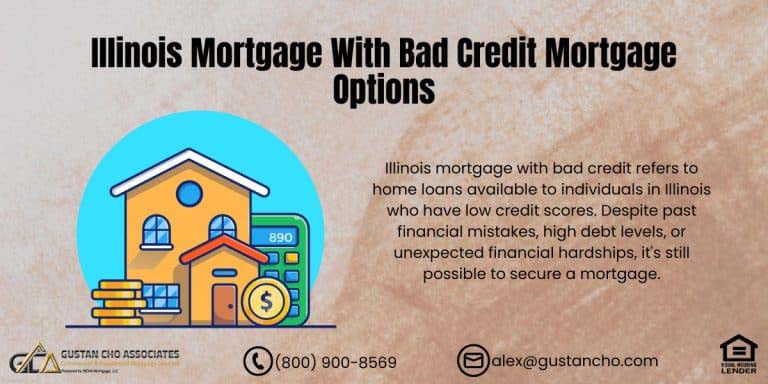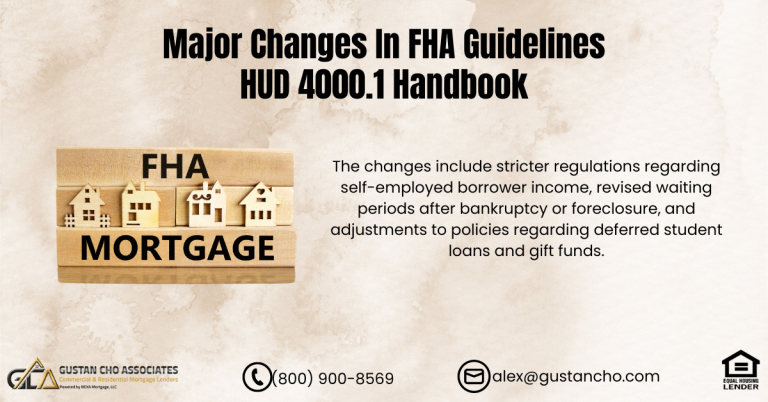This Article Is About How Loan Officers Qualify Borrowers And Issue Pre-Approvals.
Understanding how loan officers qualify borrowers is crucial in the mortgage process. The pre-approval process is the most critical stage, setting the foundation for the mortgage journey. Often, last-minute loan denials occur because the loan officer initially needed to adequately qualify the borrowers. The mortgage industry is complex, requiring loan officers to gain expertise in various mortgage guidelines and unique case scenarios over time. Loan officers ‘ proper qualification of borrowers is essential to avoid complications later in the process.
How Loan Officers Qualify Borrowers And Issue Pre-Approvals: Understanding And Getting Familiar With Case Scenarios
Every mortgage case scenario can be different depending on the borrower’s credit and income issues.
Loan Officers are not just faced with being familiar with the various mortgage lending guidelines by FHA, VA, USDA, Fannie Mae, and Freddie Mac, but they also need to know their employer’s investor overlays. Each lender has its own lender overlay. Lender overlays are mortgage requirements that are above and beyond the minimum federal lending guidelines.
Just because a borrower meets the minimum HUD FHA Guidelines does not mean that they will get qualified with all FHA-approved lenders. For example, HUD, the parent of FHA, requires borrowers to have a 580 FICO credit score to qualify for a 3.5% down payment home purchase loan. A lender does not have to lend with a borrower who applies with them with a 580 FICO credit score. Mortgage companies can have lending requirements that are above and beyond the minimum agency guidelines.
Loan Officers: Ready to Qualify Borrowers and Issue Pre-Approvals? Let’s Get Started!
Contact us today to learn how we can support you in streamlining the process and growing your business.How Loan Officers Qualify Borrowers for Pre-Approval?
For pre-approval, a lender typically requires the following information and documents from a borrower:
- Proof of Income:
- Recent pay stubs (usually covering the last 30 days).
- W-2 forms for the past two years.
- If self-employed, tax returns for the past two years and a year-to-date profit and loss statement.
- Employment Verification:
- Contact information for your employer(s) to confirm your employment status and income.
- Sometimes, lenders may also request a letter from your employer confirming your employment.
- Credit History:
- Authorization to pull your credit report to check your credit score and history.
- Detailed information on any outstanding debts or loans.
- Assets and Debts:
- Bank statements from the past two to three months are required to verify your savings and checking accounts.
- Statements from other asset accounts, such as retirement accounts or investment accounts.
- Document other debts, including credit card balances, car loans, student loans, etc.
- Identification:
- A valid government-issued ID (e.g., driver’s license or passport).
- Your Social Security number (or ITIN if applicable).
- Down Payment:
- Information on how much you plan to put down as a down payment and where these funds come from.
- Other Documents:
- If applicable, divorce decree (if alimony or child support is used as income).
- Gift letters if you receive money from family or friends to help with the down payment.
Gathering these documents in advance can help streamline the pre-approval process and demonstrate to the lender that you are a serious and prepared borrower.
Agency Mortgage Guidelines Versus Lender Overlays
Most lenders do have overlays on credit scores. They will require a higher credit score than the minimum 580 FICO credit score required by HUD. Most banks will require a 640 FICO credit score. Some mortgage companies will go down to a 620 FICO credit score.
There are lenders who will go down to 580 FICO credit scores like Gustan Cho Associates. HUD allows borrowers with under 580 FICO credit scores to qualify for FHA Loans. However, a 10% down payment is required.
Gustan Cho Associates will approve borrowers with credit scores down to 500 credit scores with an approve/eligible per automated underwriting system. Besides the 10% down payment, compensating factors are expected with borrowers with low credit scores. Gustan Cho Associates does not have any lender overlays on government and conventional loans.
Understanding how loan officers qualify borrowers is crucial for those seeking loans, as requirements can vary significantly among different lenders.
How Loan Officers Qualify Borrowers And Issue Pre-Approvals: Initial Interview Between Loan Officer And Borrowers
How Loan Officers Qualify Borrowers? The initial interview:
The first step in getting pre-qualified and pre-approved for a home loan involves an initial interview between the borrower and the loan officer. During this interview, the loan officer will ask questions before taking the loan application and running a credit check.
One of the first critical questions the loan officer will ask is which state the borrower wants to purchase a home in, especially if the borrower contacts the loan officer through an online ad. This question is important because the mortgage company the loan officer represents must be licensed to originate and fund a mortgage loan in that state.
Additionally, the branch office where the loan officer holds their mortgage loan originator’s license must also be licensed in the state where the borrower wants to get a home loan. Finally, the loan officer themselves needs to be licensed in that state.
These licensing requirements apply to mortgage brokers and mortgage bankers. However, FDIC-insured banks are exempt from state licensing requirements. This means that if a loan officer is employed by an FDIC bank, they do not need to be licensed in many states and are exempt from taking and passing the NMLS exam.
During the interview, the loan officer should take detailed notes to ensure they capture all relevant information from the borrower.
About Gustan Cho Associates
Here are the typical questions loan officers should ask borrowers when pre-qualifying borrowers during the initial interview:
- What is the price range of the home you are planning on purchasing? ( Important for DTI Calculations)
- What is the property taxes on the home that you have been looking for? ( Important for DTI Calculations)
- Do you know approximately how much the homeowners’ insurance premium is and if the property is located on a flood plain? ( Important for DTI Calculations)
Borrowers:
- Who are the borrowers ( caller and spouse or just caller)
- Are the borrowers hourly, salaried, or self-employed?
- If hourly, ask how much an hour, overtime, and/or bonus income
- if so if they had the longevity of at least two years
- if salaried employees ask how much they make as an annual salary and divide that by 12 to calculate monthly gross income
If self-employed, ask if they have been self-employed for at least two years.
Looking to Qualify Borrowers and Issue Pre-Approvals? Let Us Support You!
Contact us today to discover how our tools and services can help you qualify borrowers and issue pre-approvals efficiently.Key Questions Loan Officers Should Ask Borrowers
Loan officers should take time in interviewing borrowers. Most borrowers may not know what information to volunteer. Therefore, it is key to ask borrowers important questions that may affect their qualifications. The following questions should be asked:
- Social security income
- pension income
- child support income can be counted
- Part-time income
- overtime income
- bonus income
- other income can be counted as long as they had a history of receiving such income for the past two years and the probability of continued income will look promising for the next three years.
Those with irregular income and/or higher debt to income ratios, ask them if the need arises if they can get a non-occupant co-borrower to go on the loan with them.
Liabilities And Credit Of Borrowers In Determining Debt To Income Ratios
Ask them if they have a car payment, student loans, any other monthly debts. Ask them if they have credit cards. What the limits are and the balances (Used for debt to income ratio calculations and to see if there is any room for credit improvement). Paying down maxed-out credit cards is a great way of boosting up credit scores).
Waiting Period Agency Guidelines On Government And Conventional Loans
Loan officers must verify if borrowers have had any prior bankruptcies or housing events. In some cases, bankruptcies, foreclosures, deeds in lieu of foreclosures, short sales, judgments, and tax liens may not appear on consumer credit reports. The waiting period for a foreclosure or Deed instead of foreclosure starts from the actual recorded event date, not the date the property was surrendered to the lender.
- Bankruptcy Waiting Periods:
- FHA and VA Loans: Borrowers must wait 2 years after a Chapter 7 Bankruptcy.
- Conventional Loans: Borrowers must wait 4 years after a Chapter 7 Bankruptcy.
- Chapter 13 Bankruptcy:
- Conventional loans have a four-year waiting period after the dismissal date.
- A mandatory waiting period after the discharge date to qualify for conventional loans also applies.
- Foreclosure and Deed instead of Foreclosure Waiting Periods:
- FHA and USDA Loans: Borrowers must wait 3 years after the recorded foreclosure date, Deed, or short sale instead of foreclosure.
- VA Loans: Borrowers must wait 2 years after a foreclosure, Deed instead of foreclosure, or short sale.
- Conventional Loans:
- Borrowers must wait 4 years after a deed instead of foreclosure or short sale.
- A 7-year waiting period is required after a foreclosure.
The waiting period for a foreclosure or deed in lieu of foreclosure starts from the recorded date or sheriff’s sale date, not the day the property was surrendered or the keys were handed over.
Gustan Cho Associates offers non-QM mortgages one day after bankruptcy or foreclosure with a 30% down payment.
Mortgage Included In Bankruptcy Lending Guidelines
Mortgage Part Of Bankruptcy On Conventional Loans :
There are instances where borrowers can qualify for Conventional Loans but not FHA Loans due to the recorded date of their foreclosure on cases where their mortgage was included as part of their Chapter 7 Bankruptcy.
If you had a mortgage or mortgages included as part of your Chapter 7 Bankruptcy the following guidelines applies:
- there is a four year waiting period from the discharged date of Chapter 7 Bankruptcy discharged date
- the recorded date and/or sheriff’s sale date of your foreclosure does not matter
- this holds true even though is much later after the discharged date of your BK
- This does not apply with FHAlLoans
With FHA, if you have a mortgage included in your Chapter 7 Bankruptcy, there is a three-year waiting period from the recorded date of your foreclosure and/or sheriff’s sale date. This can be an issue when qualifying for an FHA Loan if the recorded date of the foreclosure is prolonged many years after the Chapter 7 Bankruptcy discharged date.
Want to Qualify Borrowers and Issue Pre-Approvals More Effectively? Let’s Help!
Contact us today to learn how we can support your process and help you close more deals.Questions To Ask Borrowers About Credit And Public Records
Ask about collection accounts, charge-off accounts, judgments, tax liens, or delinquent child support and/or student loan accounts.
Loan officers need to understand that just because a borrower may meet HUD or Fannie/Freddie lending guidelines does not mean that they are fully qualified and a pre-approval can be issued. Loan officers need to check with their employer and make sure on the investor overlays their company has and get familiar with it before issuing the borrower a pre-approval letter.
Loan officers also need to be aware that if a borrower went through credit repair and had public records such as the following:
- bankruptcies
- foreclosures
- short sales
- judgments
- tax liens removed off their credit reports that it will pass Automated Underwriting System
However, all borrowers will go through a third-party public records check and all public records will be discovered.
Completing Mortgage Application And Credit Check
Here’s How Loan Officers Qualify Borrowers:
The Pre-Approval Process:
Once a loan officer determines that a borrower pre-qualifies for one of their loan programs, the pre-approval process begins. The loan officer may take the application over the phone or direct the borrower to their company’s website to complete the official 4-page mortgage loan application, 1003.
After reviewing the completed 1003, the loan officer will run a tri-merge credit report. They will then use the middle of the three credit scores from this report to further assess the borrower’s qualification for the loan.
The loan officer needs to carefully review the borrowers’ credit report and look out for the following:
- Payment history for the past 12 months is a must on how loan officers qualify borrowers
- The best way how loan officers qualify borrowers is for them to thoroughly review the borrower’s overall credit history besides just the borrowers’ credit scores
- Look for late payments, credit disputes, collections, periodic late payments, and mistakes on the borrower’s credit report
Credit Disputes:
The process of how loan officers qualify borrowers can vary, but certain standards are consistently applied across the board. Every loan officer must thoroughly review the borrower’s credit report, specifically checking for credit disputes.
The outstanding balance must exceed $1,000 for borrowers to be ineligible for credit disputes on non-medical collection accounts. Additionally, borrowers cannot have credit disputes on charge-off accounts.
However, borrowers can have credit disputes on medical and non-medical collection accounts with zero outstanding balances.
Qualified Income And Debt To Income Ratios
The Importance Of Income In The Qualification And Pre-Approval Process:
Proper Income Qualification:
- Ensuring income is properly qualified is crucial.
- If there are any doubts about the income, loan officers should verify employment before issuing a pre-approval.
Handling Collection Accounts:
- Loan officers must include 5% of non-medical collection accounts over $2,000 as monthly debt in debt-to-income ratio calculations, even if the borrower isn’t making payments.
- If this 5% calculation disqualifies the borrower, they can negotiate a written agreement with the creditor. The agreed payment amount will be used in debt-to-income calculations.
Lender Overlays on Collections and Charge-Offs:
- Loan officers should verify their company’s policies on collections and charge-offs to ensure no additional lender overlays.
- Some mortgage companies may require collection accounts and charge-offs to be paid off, even if HUD does not mandate it.
Automated Underwriting System
How Loan Officers Qualify Borrowers: Automated Underwriting System. How loan officers qualify borrowers depends on the individual loan officer. Again, I cannot stress enough the importance of the pre-approval stage of the mortgage loan process. The number one reason why there is major stress during the mortgage process and the single biggest reason for last-minute loan denials is due to the borrower not being properly pre-qualified by their loan officer.
Believe it or not, there are still loan officers that issue pre-approval letters to borrowers in 30 minutes or less. They issue pre-approvals without properly reviewing the necessary docs and reviewing the borrower’s credit report.
Just because you have a higher credit score does not automatically qualify a borrower. Special attention needs to be given to the borrower’s payment history, especially the past 12 months. Late payments on a mortgage in the past 12 months can mean denial from the Automated Underwriting System. It is always recommended that a loan officer run the borrower’s mortgage application through the Automated Underwriting System.
Importance Of Automated Underwriting System Approval Prior To Issuing A Pre-Approval Letter
Ensure you obtain an approved/eligible status per automated findings before issuing a pre-approval letter:
For example, if a borrower has a 580 FICO credit score and qualifies for a 3.5% down payment FHA home purchase loan, the Automated Underwriting System (AUS) may require verification of rent as part of the conditions.
Suppose the borrower has been living with family and cannot provide 12 months of canceled checks or bank statements showing their rental payments being deducted from their bank account. In that case, this borrower will not qualify for an FHA Loan. This is because the verification of rent cannot be proven, making the AUS invalid.
All conditions listed on the AUS need to be met. Sometimes, a borrower may become anxious and threaten to go to a different lender if the loan officer does not provide a pre-approval. Due to the potential consequences, it is best to let the borrower go to a different lender.
Issuing a pre-approval before the loan officer is absolutely sure can create numerous problems. A borrower might enter into a purchase contract without qualifying for the mortgage, which affects the sellers, the realtors, the attorneys, and everyone involved in the mortgage process.
About The Author Of How Loan Officers Qualify Borrowers
Alex Carlucci is the author of this blog on How Loan Officers Qualify Borrowers. Alex Carlucci is an associate contributing editor and a senior loan officer at Gustan Cho Associates. Alex is in charge of The Gustan Cho Team Rapid Response Group at Gustan Cho Associates.
Both Alex Carlucci and Gustan Cho Associates are available 7 days a week, evenings, weekends, and holidays to take on calls from borrowers. Over 75% of our borrowers are folks who have gotten a last-minute mortgage loan denial. Or are going through a major stressful loan process due to not being properly qualified by their current loan officers.
How Loan Officers Qualify Borrowers: Importance Of Fully Qualifying Borrowers Prior To Issuing Pre-Approvals
Alex Carlucci and Tammy Trainor specialize in the following loan programs:
- FHA loans with no overlays
- VA loans with no overlays
- USDA Loans with no overlays
- Conventional loans with no overlays
- Jumbo mortgages
- Non-QM mortgages
- FHA 203k loans
- Reverse mortgages
Please email us at gcho@gustancho.com or call or text us for a faster response at 800-900-8569 if you have any questions.
FAQs: How Loan Officers Qualify Borrowers And Issue Pre-Approvals
-
1. What is the importance of the pre-approval process in the mortgage journey? The pre-approval process is critical because it sets the foundation for the mortgage journey. Properly qualifying borrowers at this stage helps avoid last-minute loan denials and ensures a smoother process for all parties involved.
-
2. What factors do loan officers consider when qualifying borrowers? Loan officers evaluate a range of factors when considering loan applications. These include an applicant’s credit score and history, stability of income and employment, debt-to-income ratio, assets and savings, the amount of down payment, and the overall financial situation and obligations.
-
3. What documents do lenders typically require for pre-approval? For pre-approval, lenders typically require proof of income, employment verification, credit history, assets and debts, identification, down payment information, and any other relevant documents, such as a divorce decree or gift letter, if applicable.
-
4. What are lender overlays, and how do they affect loan approval? Lender overlays are additional mortgage requirements individual lenders set beyond the minimum federal lending guidelines. Even if a borrower meets the minimum guidelines set by HUD, VA, USDA, Fannie Mae, or Freddie Mac, they may still need to meet the specific overlays of the lender they are applying to.
-
5. How does the Automated Underwriting System (AUS) affect the pre-approval process? The AUS evaluates the borrower’s information and provides an approved/eligible status if the conditions are met. All conditions listed by the AUS must be fulfilled to validate the pre-approval. For example, the AUS might require rent verification, which the borrower must provide to proceed with the loan.
-
6. Why is it important for loan officers to be thorough during the initial interview with borrowers? During the initial interview, loan officers gather detailed information about the borrower’s financial situation. This step is crucial to ensure that all relevant factors are considered and that the borrower is properly pre-qualified. Important questions include details about income, employment status, debts, and any unique financial circumstances.
-
7. What should loan officers check regarding a borrower’s credit report? Loan officers should review the borrower’s credit report to assess payment history over the past 12 months, check for any credit disputes, examine collections, charge-offs, and other negative items, and evaluate the overall credit history and score.
-
8. How do loan officers handle irregular income or high debt-to-income ratios? For borrowers with irregular income or high debt-to-income ratios, loan officers may ask if a non-occupant co-borrower can be added to the loan. They also assess the stability and continuation of additional income sources such as social security, pensions, child support, part-time jobs, overtime, and bonuses.
-
9. What are the waiting periods for borrowers with prior bankruptcies or housing events? FHA and VA loans require a 2-year waiting period after Chapter 7 bankruptcy, while conventional loans require 4 years. For Chapter 13 bankruptcy, conventional loans need a 4-year waiting period after dismissal. After foreclosure, FHA and USDA loans require a 3-year waiting period, VA loans require 2 years, and conventional loans require 4 years.
-
10. What happens if a borrower cannot meet the AUS conditions? Suppose a borrower must meet the conditions set by the AUS, such as providing rent. In that case, or else they may qualify for the loan. Loan officers must ensure all conditions are met before issuing a pre-approval to avoid potential issues.
-
11. What is the role of Alex Carlucci and Gustan Cho Associates in the mortgage industry? Alex Carlucci and Gustan Cho Associates specialize in various loan programs, including FHA, VA, USDA, conventional, jumbo, non-QM, FHA 203k, and reverse mortgages. They offer assistance seven days a week and help borrowers facing last-minute loan denials or stressful loan processes due to improper qualification by their previous loan officers.
This BLOG On How Loan Officers Qualify Borrowers Was UPDATED On May 21st, 2024.










